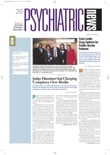Plaintiffs in a class-action lawsuit in California against APA and pharmaceutical giant Novartis failed to meet a federal judge’s test for allowing the suit to proceed, and as a result the judge has dismissed it.
Judge Rudi Brewster of U.S. District Court in San Diego decided on April 26 to follow through on his vow to throw out the suit, which alleged that APA had created and heavily promoted the diagnosis of attention deficit/hyperactivity disorder (ADHD) in several versions of its Diagnostic and Statistical Manual of Mental Disorders (DSM) as part of a conspiracy with Novartis to boost sales of the company’s methylphenidate product Ritalin (Psychiatric News, August 4, 2000; April 6).
On March 13 Brewster had informed all parties to the suit that he saw so many defects in the plaintiffs’ case that unless they corrected them by April 16, he would dismiss it.
He cited two primary flaws. First, the plaintiffs’ complaint was legally invalid because it failed to allege any link between APA’s development and publishing of the ADHD diagnosis and the injuries the plaintiffs claim to have suffered as a result of any link. Second, the plaintiffs’ claim as presented conflicted with a California statute that bars suit based on the exercise of free-speech protections granted under the U.S. Constitution’s First Amendment.
After receiving none of the information he had asked the plaintiffs to provide to bolster their case, Brewster dismissed the case “with prejudice,” a decision that bars the plaintiffs from filing the suit again. He also ordered them to pay legal fees incurred in conjunction with this lawsuit by APA, Novartis, and CHADD, a support group for parents of children with ADHD.
The suit was filed in September 2000 in U.S. District Court in San Diego by Deborah Voss, the mother of a child who had been diagnosed with ADHD and for whom she had purchased Ritalin that had been prescribed in conjunction with her son’s treatment. She sought to have it declared a class-action suit, which would have expanded it to include all families in California who met these criteria.
Similar suits have been filed against APA and Novartis in New Jersey, Texas, Florida, and Puerto Rico. These suits will not be subject to the type of legal scrutiny that state law imposed on the California judge and will have to be evaluated on different grounds depending on the wording of applicable state laws.
APA leaders are extremely pleased that the judge found no merit in the suit. In an interview with Psychiatric News, APA President Daniel Borenstein, M.D., described Brewster’s decision as “a marvelous outcome that shows that the suit had no basis in fact.” He added that he is hopeful that the California judge’s decision will play a role when the judges in the other courts assess suits similar to this one.
Borenstein emphasized that Brewster’s ruling “is a victory for the scientific process, for sound medicine, and for a free and open discussion of medical issues.” He pointed out that it is also a victory “for parents who want to act in the best interest of their children by seeking appropriate treatment for a common disorder.”
Steven Mirin, M.D., medical director of APA, said in a press release that he regretted that the “frivolous lawsuit” was ever filed, adding that “the existence of ADHD is based on a mountain of widely accepted scientific evidence accumulated over decades of helping millions of children.”
The plaintiffs have indicated that they intend to appeal the judge’s decision to the U.S. Circuit Court of Appeals. ▪
